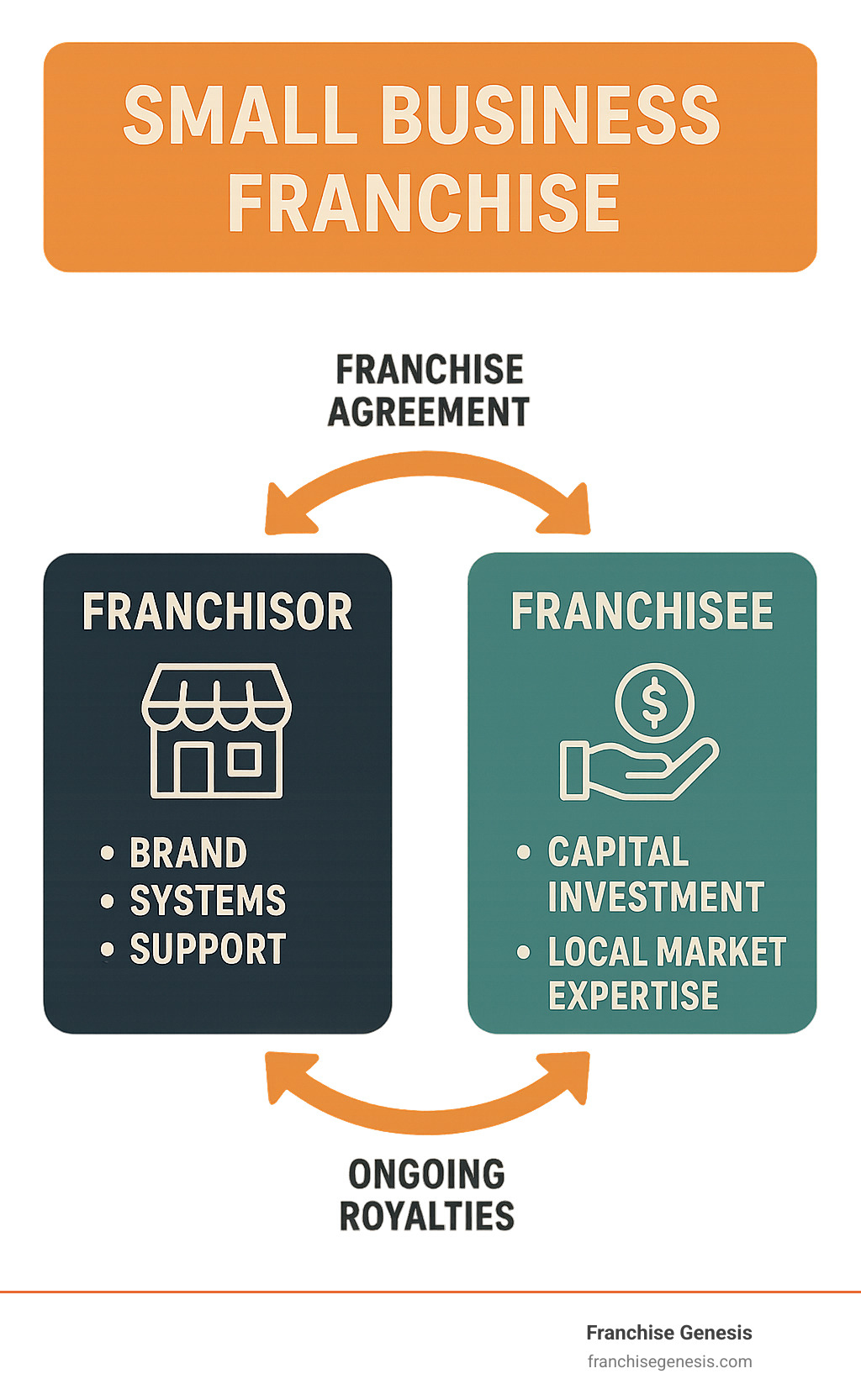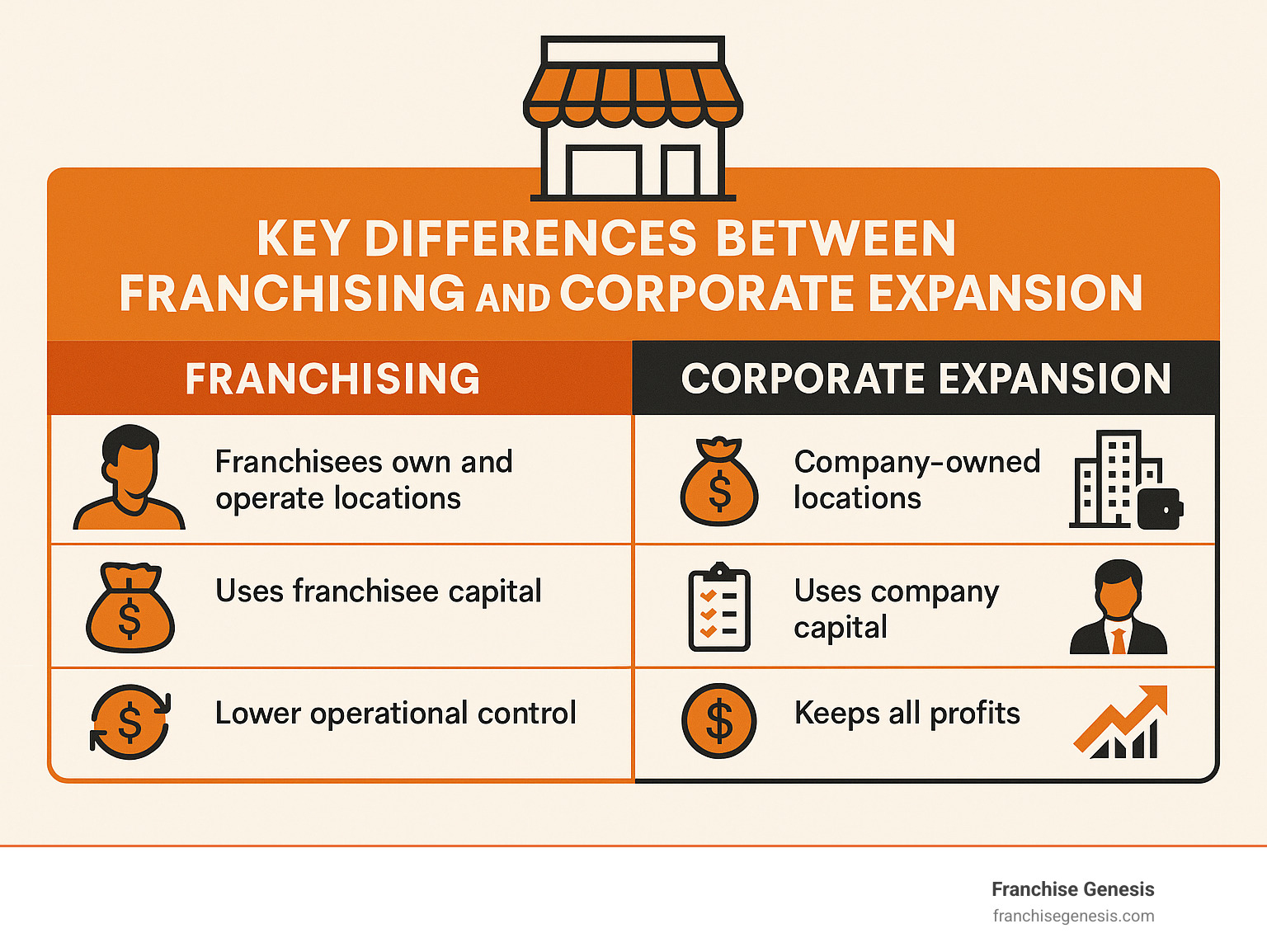Why Small Business Franchise Systems Create Unstoppable Growth
A Small business franchise is a powerful way to scale a proven business model. Instead of funding company-owned locations, you partner with motivated entrepreneurs who invest their own capital to replicate your success. Industry data highlighted by the U.S. Small Business Administration underscores how franchised brands routinely outpace independent chains in job creation and economic output, making this growth path especially compelling.
Key Elements of Small Business Franchising:
- Franchisor Role: You provide the business system, brand, and ongoing support
- Franchisee Investment: Partners pay franchise fees and invest in their own locations
- Proven Model: Your business must have demonstrated success and profitability
- Scalable Systems: Operations need to be documented and replicable
- Legal Framework: Requires Franchise Disclosure Document (FDD) and compliance
- Ongoing Support: Training, marketing, and operational assistance for franchisees
Many successful business owners think they need hundreds of thousands of dollars to expand their company. The reality is that franchising flips this model – your franchisees provide the capital for growth while you retain control of your brand and systems.
As Eric Stites from Franchise Business Review notes: “There are some great low-cost franchises that can provide a very high return on your investment in the long run.” This principle works both ways – franchisees can start affordably, while franchisors can expand without massive capital requirements.
I’m Monique Pelle-Kunkle, Vice President of Operations at Franchise Genesis, and I’ve helped scale numerous small business franchise systems, including an ABA therapy franchise that grew to over 100 locations in its first year. My experience guiding business owners through the franchising process has shown me that with the right systems and support, any proven business model can become a successful franchise opportunity.

Is Your Business Ready for Franchising?
Scaling your business nationwide is exciting, but is your business truly ready to become a small business franchise? This isn’t just about being successful—it’s about having a proven system that someone else can replicate.

Successful franchises work because of rock-solid systems that deliver consistent results, not the magic touch of the original owner. While franchise businesses typically have higher success rates than independent startups, this means you must provide an incredibly strong foundation for your partners.
The good news? If your business has the right fundamentals, franchising can be an amazing way to grow without the massive capital investment that traditional expansion requires. To dive deeper into this opportunity, check out More on why you should franchise your business. And when you’re ready for a thorough evaluation, you can Assess if your business is ready to become a franchise.
Assessing Your Business Model’s Viability
Your business model must pass several crucial tests. First, there must be consistent demand for your product or service in different markets, not just your hometown. Second, strong profit margins are non-negotiable; your franchisees must be able to turn a profit after paying all expenses and fees. Third, your business needs replicable processes that can be documented so a stranger can achieve the same results. Finally, you need clear market differentiation—a unique value that competitors can’t easily copy and that you can protect across all locations.
If your success depends on personal relationships or intuition that can’t be taught, you have work to do before your systems are ready.
Evaluating Your Brand and Financial Health
Beyond operations, evaluate your brand and financial health. Your brand must represent quality and consistency to give franchisees instant credibility and attract customers from day one.
Financial stability is also key, as you’ll need capital for the initial setup—legal fees, FDD creation, and marketing—which can range from $20,000 to over $100,000. You also need ongoing capital to support your franchisees as they grow.
Finally, legal compliance is mandatory. You’ll need to form a proper business entity (like an LLC or corporation) for your franchising company and work with a franchise attorney to steer complex state and federal laws. Becoming a franchisor means changing from a business owner into a business system creator and supporter. Take the time to honestly assess where you stand—your future success depends on it.
The Pros and Cons of Turning Your Business into a Franchise
Deciding to turn your business into a small business franchise is a major step. Unlike opening more company-owned locations, franchising involves partnering with entrepreneurs who invest their own money to replicate your success. This model can accelerate your growth in ways you might not have imagined.

The beauty of franchising lies in how it harnesses the entrepreneurial spirit of others to fuel your brand’s expansion. Rather than shouldering all the financial risk and operational burden yourself, you’re creating a network of motivated business partners who share your vision for success.
If you’re curious about how this expansion strategy might fit into your long-term business goals, I encourage you to explore our franchise growth strategies for a deeper dive into the possibilities.
The Upsides: Benefits of Franchising
Franchising offers several incredible advantages as a growth strategy:
- Faster expansion with lower capital investment: Your franchisees provide the capital to fuel rapid growth, allowing you to enter new markets much quicker and with less financial risk.
- Motivated owner-operators: Franchisees have invested their own money, making them highly committed to their location’s success. This typically leads to better customer service and stronger local engagement.
- Increased brand recognition: Each new franchise acts as a billboard for your brand, creating powerful market penetration across a wider geographic area.
- New revenue streams: You gain upfront franchise fees when new partners join, and more importantly, ongoing royalties. These recurring payments fund your support operations and create a sustainable, long-term profit model.
The Downsides: Challenges of a Small Business Franchise
Every growth strategy has challenges, and it’s important to understand the realities of franchising:
- Loss of direct control: You set the standards, but your franchisees run their own businesses. This shift from direct management to guidance and influence can be a major adjustment.
- Obligation to support franchisees: You must provide continuous training, marketing, and operational assistance. This requires building a dedicated support team and infrastructure.
- Complex legal landscape: You’ll steer detailed contracts, Franchise Disclosure Documents, and varying federal and state regulations, making experienced legal counsel essential.
- Potential for brand dilution: If a franchisee provides poor service or fails to meet standards, it reflects on your entire brand. Protecting your reputation requires robust quality control.
- Sharing profits: While you gain new revenue streams, you won’t capture 100% of each location’s revenue. The trade-off is achieving growth at a scale that would otherwise be impossible.
Understanding these realities helps you make an informed decision about whether a small business franchise model aligns with your goals and comfort level.
Key Steps to Creating Your Small Business Franchise System
So, you’ve assessed your business, weighed the pros and cons, and decided that franchising is the path for you. Now comes the exciting part – changing your successful business into a thriving small business franchise system. Think of this as building a bridge between your current success and your future empire.

This process requires careful planning and attention to detail, but you don’t have to walk the path alone. At Franchise Genesis, we’ve guided countless business owners through this change. If you’re ready to take the plunge, our business to franchise conversion services can help you steer every step of this journey.
The franchising process unfolds in three major phases: establishing your legal and financial foundation, developing your operational systems, and marketing your opportunity.
Building the Legal and Financial Foundation
Your legal foundation is the most critical part of your franchise system. Breaking it down into manageable steps makes it approachable.
- Forming a corporation or LLC is your first step. This separate legal entity protects your personal assets and creates a professional structure.
- Working with a franchise attorney is non-negotiable. They will guide you through complex franchise laws, help protect your intellectual property, and ensure compliance.
- Understanding franchising costs is key for planning. Expect to invest $20,000 to over $100,000 in legal fees, system development, and initial marketing.
- The Franchise Disclosure Document (FDD) is a comprehensive legal document required by the Federal Trade Commission that discloses all essential information about your opportunity to potential franchisees.
- State registration is also required in many states, adding another layer of compliance and cost to your expansion plan.
Developing Your Operations and Support Systems
This is where you turn your successful business into a replicable system that others can master.
- Creating standardized operations manuals is essential. Document every aspect of your business so franchisees have a clear roadmap to replicate your success.
- Developing comprehensive training programs ensures your partners can execute your system. This includes both initial training and ongoing education.
- Building your support infrastructure means assembling a team to provide operational guidance, marketing help, and problem-solving assistance.
- Supply chain management becomes critical. You’ll need to establish cost-effective vendor relationships or distribution networks to serve multiple locations.
- Quality control procedures, like regular audits, protect your brand’s reputation by ensuring all franchisees maintain your standards.
Marketing Your Small Business Franchise Opportunity
Once your systems are solid, it’s time to attract the right partners to join your small business franchise family.
- Developing compelling marketing materials that tell your brand’s story and highlight the benefits of your system is the first step.
- Building a dedicated franchise sales website provides a professional hub for potential franchisees to learn about your opportunity and for you to capture leads.
- Identifying your ideal franchisee profile helps you target marketing efforts toward candidates with the right skills, values, and financial capacity to succeed.
- Lead generation strategies like online advertising, trade shows, or working with franchise brokers will bring qualified prospects to your door.
For detailed strategies on attracting and converting the right franchisees, check out our Guidance on franchise sales & marketing.
Frequently Asked Questions about Franchising Your Business
Exploring the path to becoming a small business franchise naturally brings up many questions. Here are answers to some of the most common ones we hear from business owners.
What is the difference between franchising and licensing?
The key difference is the level of control and support. Licensing typically involves renting out your brand or trademark with minimal ongoing involvement. Franchising, on the other hand, is a regulated relationship where you provide a complete business blueprint, including operational systems, training, and ongoing support. You maintain significant control to ensure brand consistency. If you provide this level of support and control, the law will likely consider it a franchise, regardless of what you call it, requiring you to comply with all franchise regulations.
How long does it typically take to franchise a business?
The timeline to franchise a business typically ranges from three to twelve months. The exact duration depends on factors like your business complexity, the state of your existing operational documents, and legal preparations. The most time-consuming parts are often creating the Franchise Disclosure Document (FDD) and systemizing your operations into detailed manuals. A realistic plan would be for six to twelve months to build a solid foundation.
What kind of support must I provide to my franchisees?
As a franchisor, you have a legal and ethical obligation to support your franchisees. This support is multifaceted and ongoing:
- Initial Training: Comprehensive instruction on every aspect of your business model before they open.
- Ongoing Operational Support: Continuous guidance through field visits, phone support, and regular check-ins to help troubleshoot issues and share best practices.
- Marketing and Advertising: Developing brand-wide campaigns and providing local marketing materials and guidance.
- Technology and Tools: Providing access to and training for essential software like POS systems or CRM platforms.
- System Improvements and Quality Control: Continuously improving your business model and conducting regular audits to ensure brand standards are met across all locations.
Your franchisees’ success is your success. When they thrive, your royalty income grows, your brand strengthens, and your entire system becomes more attractive to future franchisees. Supporting them isn’t just an obligation – it’s smart business.
Conclusion
Changing your business into a small business franchise is a challenging yet rewarding journey. Each new location represents not just expansion, but a partnership with an entrepreneur who shares your vision.

Choosing franchising is a strategic decision to build a brand legacy that can outlast your direct involvement. The model is built on long-term partnerships where your success is tied directly to the success of your franchisees. While it requires navigating legal complexities and committing to ongoing support, you are effectively mentoring other entrepreneurs, giving them the tools to succeed while building something bigger than any single location.
With the right foundation and support, your proven business model can become an unstoppable force for growth. At Franchise Genesis, we understand this is a significant decision. We are committed to being your trusted guide through every step of this change, from initial assessment to attracting your first franchisees.
Ready to explore how your unique business can become the next great franchise opportunity? We’d love to help you turn that vision into reality. Find our services for franchisors and franchisees and let’s start building your franchise legacy together.
